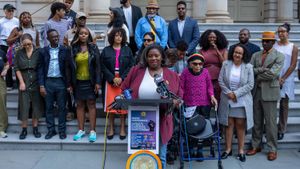A spirited protest erupted inside New Zealand's Parliament on Thursday, November 14, as Māori lawmakers utilized the traditional haka dance to voice their opposition against the Principles of the Treaty of Waitangi Bill. This controversial bill, which seeks to redefine the relationship between New Zealand's government and Indigenous Māori people, has become the centerpiece of heated debates across the nation.
The Treaty of Waitangi, which was signed back in 1840, is considered the foundational document recognizing the rights of Māori. It was originally established as part of agreements between Māori chiefs and the British Crown, focusing on acknowledging Māori rights and landownership. The proposed bill, spearheaded by David Seymour, the leader of the ACT New Zealand Party, could potentially alter the treaty’s legacy and undermine its historical significance. The bill reportedly aims to provide equal rights to all New Zealand citizens, which many Māori perceive as diluting their unique status and rights granted through the treaty.
During the parliamentary session, when Speaker Gerry Brownlee queried Māori lawmaker Hana-Rawhiti Maipi-Clarke about her party's stance on the bill, she emphatically tore up what appeared to be the bill and commenced performing the haka. Joined by fellow members of Parliament and several spectators, Maipi-Clarke led this powerful ceremonial dance, traditionally used to challenge opponents. The protest culminated with the suspension of the parliamentary session due to the disruption, with Brownlee labeling the act as "disrespectful."
This dramatic demonstration is part of broader protests occurring nationwide. According to reports, hundreds of Māori have converged on Wellington, the capital, with plans for extensive rallies against the bill. Many are deeply concerned about the potential ramifications of the legislation. They argue it could revoke dedicated land rights, government representation, and cultural preservation initiatives previously afforded to the Māori community. Critics of the bill claim it would effectively erase decades of assertions made by Māori leaders aiming to safeguard their rights.
The protest, which reverberated throughout the parliament, also aligns with wider sentiments felt among Māori communities. The situation reflects increasing frustrations toward government policies seen as neglectful of Māori needs, with many calling for immediate action to rectify this oversight. Prominent Māori leaders, activists, and supporters have echoed these complaints, advocating for recognition and respect for the treaty. Many assert the need for more thoughtful dialogue surrounding Indigenous rights, emphasizing the importance of not dismissing the historical struggles endured by the Māori people.
Opposition to the bill has not been limited to Māori communities; widespread public backlash has caught the attention of various political entities. Even among Seymour’s coalition partners, doubts about the bill's viability have surfaced. Prime Minister Christopher Luxon, associated with the right-wing National Party, expressed concerns, stating, "You do not go and negate, with a single stroke of a pen, 184 years of debate and discussion with a bill... very simplistic." This statement hints at the contention brewing within the coalition, with some members wary of supporting legislation billed as too radical.
The discontent isn’t merely confined to the parliamentary chamber. Protesters have taken to the streets, with tens of thousands rallying against the bill, demonstrating the high level of emotion surrounding Māori rights and the Treaty of Waitangi. The tensions culminated on Friday, November 15, with estimates showing around 10,000 people marching toward Wellington, demanding the government withdraw the bill and engage substantively with Māori concerns.
This fractious issue has reignited discussions around New Zealand's identity and the foundational role of the Treaty of Waitangi. Given the bill's potential path, it remains to be seen whether it will garner the necessary support to pass through subsequent readings and if civil unrest will continue to escalate. The outcry from Māori communities suggests they are unwilling to allow their rights to be compromised without contest, setting the stage for what promises to be fierce political battles over the future of Māori governance and rights.
Unquestionably, the stakes are high as both sides prepare for the impending debates. How the government responds to this protest may set precedents for Māori relations moving forward, making this not just another legislative battle but rather, potentially, a defining moment for New Zealand's approach to Indigenous rights.



